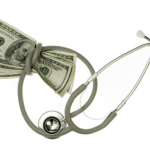Manage Your Debt - Let's Explore Your Options
GET STARTED NOWMedical Debt - A Series of Financial Tips

Major medical bills usually come as a surprise to many people, and these days, the surprise can be a big one. Today’s tough economy has driven many Americans deeper into debt. All too often, households are forced to pay their bills with credit cards just to make ends meet, and according to the Federal Reserve, our nation’s revolving debt totals nearly $793 billion. So when unplanned medical bills come in, they can force a family budget to get out of balance.
In an effort to help individuals and families successfully manage medical bills, we are going to dedicate the next six blogs to ideas for managing those expenses. We will cover six tips that highlight ways to reduce costs and to protect finances when facing high medical expenses. Below is our first tip.
Financial stress can cause not only worry but also embarrassment. Many people prefer not to talk about their money problems. Unfortunately, avoidance can make those problems worse. Medical billing departments talk to people every day who have trouble paying bills. They understand what you’re going through. Rest assured the hospital staff wants to help – they simply need you to be open and honest about your situation.
An important tip for working with your medical provider is to always try to speak with the same person each time you call. Ask for the name of the person you are working with and find out if they have a direct extension that you can use. This is helpful because that person will learn about your financial needs and it will save you the frustration of having to explain your situation every time you call.
One option the hospitals may offer you is “charity care.” If you earn less than 200% of poverty level income the hospital may eliminate part or all of the debt you owe. For a family of four in 2010, 200% of the Federal Poverty level was $44,100. Some hospitals are even more generous, allowing for some level of charity care if you earn up to 300% of the poverty level.
Most large medical providers also have full-time financial counselors on staff whose job is to help you find ways to pay your bills. They will offer manageable repayment plans if you qualify. They’ll also work hard to make sure you’ve received all the coverage to which you’re entitled from your insurance company, workers’ compensation, Medicaid, and other programs that may be available.
This applies even AFTER your account has been turned over to collections. You can call your hospital billing office, financial counselor, or even the collection agency responsible for your account at any time to discuss your situation. You will find that, more often than not, they will be sensitive to your situation. After all, hospitals don’t want to burn bridges with their patients. They want you to come back the next time you need medical care.
To avoid a communications failure with your hospital, always respond to their calls and letters. Be honest about your situation, and don’t hesitate to ask if you qualify for charity care or an installment plan. You can also call American Financial Solutions for help with all of your bills.
Published Oct 4, 2011.
